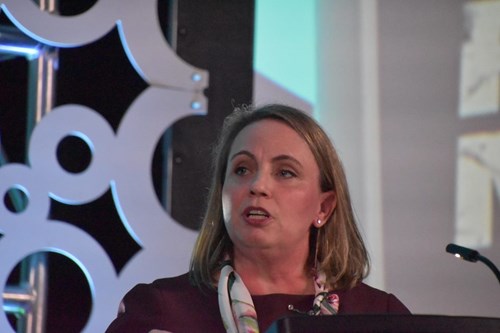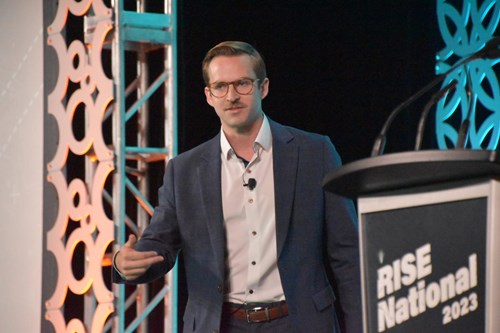This year’s conference drew a record-breaking number of 1,800 attendees, 130 speakers, and 175 sponsors who took over The Broadmoor Resort in Colorado Springs. The day was jampacked with special presentations, interactive roundtables, and concurrent specialized sessions in five different tracks, ending with our networking cocktail reception. Here are the highlights from the first day of our biggest Medicare Advantage event of the year:

Ellen Wofford, founder and CEO of RISE, opened the conference, noting that with the recent release of the Advance Notice and Final Rule, “our industry is on the verge of the most significant regulatory and compliance changes in the past decade. This year’s RISE National conference is focused on addressing those changes to help you negotiate the uncertainty we’re all facing,” she said.
Wofford then introduced the conference cochairs: Nikki Hungate, director Medicare & government programs, product strategy, MVP Health Care Kaleb Holt, Medicare program director, SelectHealth. “Unlike any other time in our industry, collaboration is trumping competition," Wofford said. The two met at a RISE conference years ago and understand the industry perspective and their pain points.



Holt said the conference will address regulatory updates, technology and innovation, changing the way we deliver care to patients and health plan members, and to people who depend on the plan to help navigate the health care industry.
Hungate shared a personal perspective on the need for equitable and fair access to care. She discussed her personal battle with ovarian cancer. Because of her network connections, she got an appointment in two weeks and began treatment immediately. "It was because of who I know that I got access to health care quickly but is that fair? For us, when we think of CMS and Medicare Advantage and Medicaid, we need to think about equitable access to health care. Everything we do should go back to that so every single person on my health plan and Kaleb's health plan, can access services equally."
Warning: Get ready for more and expanded OIG enforcement
We then got the low down on the Office of Inspector General’s position on Medicare Advantage with Christi A. Grimm, the sixth inspector general of the U.S. Department of Health and Human Services (HHS). She noted the real and persistent risk of health care fraud due to the rapid growth in programs, and the role of the OIG to ensure the integrity of the programs, as well as the health and welfare of the people they serve.


The risk of fraud, waste, and abuse in Medicare Advantage by plans, providers, and vendors is significant, she said. Plans must make improving compliance a top priority.
“I’m here to underscore my commitment to ensure Medicare Advantage and plans effectively combat fraud, waste, and abuse,” Grimm said. “It’s one of my top priorities. It should be a top priority of yours as well.”
She discussed managed care risks that the OIG has identified in their investigations. Those risks include upcoding, stinting, and misrepresentation of data that can have huge impacts, costing Medicare millions of dollars. Grimm said while risk adjustment in Medicare Advantage is important to the success of the program to treat older, sicker patients, the OIG has identified significant problems with risk adjustment.
Indeed, of the 17 HHS-OIG audits conducted since 2019, she said there was no support for nearly 69 percent of diagnoses used for risk adjustment, which led to $113 million in overpayments to plans. “Plans have a stake in the Medicare Advantage program of delivering equitable, comprehensive, and person-centered care that is sustainable and affordable. Health care abuse can jeopardize the program,” she said.
She underscored the importance of why plans should use the information provided by the OIG to look at their internal polices, procedures, and practices to identify areas for improvement. Medicare Advantage, she said, is under increased scrutiny—preparing for and embracing oversight will pay dividends.
Grimm said the OIG wants Medicare Advantage plans to be successful but its role is to ensure that the program works as intended, which means plans must ensure that enrollees receive high-quality services that are cost effective.
“Let’s start by holding wrong doers accountable,” she said, adding she is committed to take swift action against those who commit fraud. But the OIG can’t do it alone. She urged plan investigative units to identify fraud that harms enrollees and the Medicare Advantage program, and refer them to the OIG and Department of Justice. “We want to foster increased communication between plans and law enforcement in order to improve our collective enforcement ability.”
The OIG, she said, will continue to look at risk areas, such as network adequacy, benefit design, prior authorization, encounter data, and payment denials. In addition, the watchdog is currently examining Medicare Advantage efforts to reduce racial and ethnic health disparities. Investigators aim to identify actions that Medicare Advantage plans have taken to reduce these disparities as well as challenges and successes the plans have experienced.
Other regulatory worries to put on your radar
OIG audits aren’t the only headache facing health plans this year. During a deep dive into regulatory concerns, a panel of experts offered their perspectives on the top Medicare and Medicaid issues facing the industry, including Medicaid redetermination and risk adjustment model changes and other provisions proposed in the Advance Notice.


Medicaid redeterminations
Mikal L. Sutton, managing director, Medicaid, Blue Cross Blue Shield Association, said she believes “redeterminations” will be the buzzword of 2023. Fifteen million may lose their Medicaid benefits now that the pandemic health emergency and the federal mandate that prevented states from removing people from the safety-net program is ending. In fact, states can begin reevaluating eligibility for Medicaid and removing people from their rolls as soon as April 1.
The Centers for Medicare & Medicaid Services (CMS), concerned that states may be super aggressive in dumping people from Medicaid, has provided guidance to ensure they conduct due diligence before terminating them from the program. Failure to do so could result in penalties.
Some of those who will lose Medicaid may be able to get coverage under the Affordable Care Act marketplace as the government has established a special enrollment period that will run parallel to the unwinding of the Medicaid redetermination process (April 1 through May 2024). But the government expects a small number to transition to the ACA marketplace during the special enrollment period so there could be very large coverage gaps, Sutton said.
“CMS has done a phenomenal job of doing an initial outreach with plans,” she said. “Early on we had industry calls with CMS which shaped the guidance released to help states navigate this. From a plan perspective, we’ve been encouraging our plans to make sure they are committing internally because sometimes different lines of business don’t understand what others are doing.”
Sean Creighton, a contributing policy expert to RISE and the moderator of the panel discussion, warned that plans may potentially have to care for a different type of population than they’ve seen before as people transition from Medicaid.
Indeed, Medicare redetermination will cut across the health care system, said panelist Greg Gierer, vice president of policy and research, Better Medicare Alliance. The key is that the continuous enrollment provision established during the pandemic must be unwound in a responsible way. “Most people who end up losing Medicaid eligibility will be eligible for other support but it needs to be seamless so people do not fall through the cracks,” he said.
Risk adjustment model and other changes proposed in the Advance Notice
Gierer said there are many provisions in the Advance Notice that have caused concern, such as the expiration of COVID-19 flexibility related to Stars, the lower growth rate due to technical changes, and the Medicare risk adjustment model, and estimates that the changes will result in a 2.3 percent reduction in net revenue for MA plans next year. Medicare Advantage plans use rebate dollars to lower premiums or offer additional benefits in terms of supplemental benefits and lower cost sharing.
If CMS finalizes these changes, it could have a big impact on the ability to redeploy savings, he said. Overall, independent studies have found that nationwide there will be a 29 percent reduction, which could take the form of higher premiums, fewer benefits, or a combination of the two. A recent analysis by Avalere found that there would be a $540 reduction in beneficiary savings per beneficiary per year.
In addition, Better Medicare Alliance is advocating that CMS does not go forward with its proposed changes to the risk adjustment model in 2024. The risk adjustment program is complicated and the changes to the model may have unintended consequences for Medicare beneficiaries with chronic conditions, low income, and those who are dually eligible for both Medicare and Medicaid.
CMS released the Advance Notice on February 1 and only allowed 30 days to comment on it. The comment period, he said, is not enough time to analyze the implications of the changes on Medicare beneficiaries, Gierer said. “Any proposed changes for risk adjustment should be informed by shareholder engagement and phased in over an appropriate time and implemented successfully to minimize disruption,” he said.
Creighton noted the Advance Notice includes a proposal to remove a significant number of codes, which could have a huge impact for people with multiple HCCs, multiple chronic conditions, and dual eligibles. Sutton agreed that there is a concern about the transparency of this process and how CMS arrived at these numbers. It’s important to make sure the impact isn’t detrimental, she said.
Gierer said the impact of the changes will be different, depending on the type of plan, type of enrollment in the plan, and for the beneficiary, depending on how many chronic conditions, and HCCs they have. It’s important that an analysis is conducted so the industry can understand the impact before finalizing the changes.
Other concerns
The panel also noted health equity, social determinants of health, and access to care is a CMS priority for all its programs and should be on plan radars this year.
Other concerns: Changes to prior authorizations and the release of the Risk Adjustment Data Validation (RADV) final rule, which Creighton describes as a disappointment to the industry with many unanswered questions.
How to boost productivity and performance
Our high-energy keynote presenters, Dr. Sahar Yousef and Professor Lucas Miller, cognitive neuroscientists and MBA faculty, US Berkeley, explained how we can get as much done as humanly possible in less time and using less strength.

Human beings make three big mistakes when it comes to productivity and performance, Yousef explained. But there are tips to overcome them, which will help increase productivity by as much as 25 percent and without working longer hours:

- Living in a messy digital and environmental environment full of distractions. Humans are hard-wired to constantly scan our environment. Almost half of our brains are hard-wired to constantly process what we see and hear, Yousef said. Some tips to cope in our virtual workspace and eliminate the brain drain: Hide self-view during video calls (it will cause less fatigue) and turn off (almost all) of the notifications on smart phones (the biggest drain on our brains). Notifications are addictive so do a spring cleaning on all devices to only allow interruptions from the VIPs in your lives and not every application, she said. Make the devices less stimulating by going into black and white or gray scale mode. Power-down your phone at the end of the day or put the phone face down on a table in another room.
- Being a passenger and not a driver during the day. Many people wake up and spend the first 30 minutes of their day checking their phone for messages and texts. And then it becomes a roller coaster of responding to messages and soon it’s 3 p.m. and they wonder where the day went. They don’t feel productive. Humans are fundamentally wired to seek reward and avoid pain, Miller said. Brains are short-term oriented, he said, but we live in a world throwing distractions and stimulation at us so we procrastinate. Miller said we are all dopamine addicts. Dopamine is responsible for allowing us to feel pleasure, satisfaction, and motivation. So, the trick is to turn slow dopamine into fast dopamine when we are dealing with complex tasks. Dopamine is not about reward, he said, it’s about motivation. We need to fend off distractions that are more motivating but don’t matter as much in the long run. Tips: Write down one to three most important tasks to accomplish each day. Use 15- to 20-minute gaps in between meetings for the small, low important tasks. Build longer blocks of time to focus on the most important task until it is done.
- Relying on unstrategic scheduling. We are not the same as the day progresses and not all hours of the day are equal, Miller explained. All humans have a biologically pre-set circadian rhythm and they all aren’t the same. This internal rhythm dictates our optimal time to fall asleep and wake up, as well as the peaks and troughs we experience in our daily energy levels. When we can carve out time during our peaks, we can be more productive. Tips: Strategically design your day by protecting peak focus hours for strategic, cognitively intensive, high-value work. Schedule less important emails or administrative work during a lower-energy period of the day.
